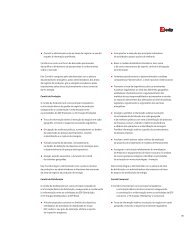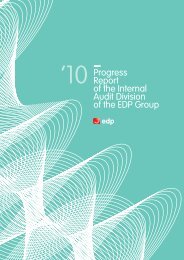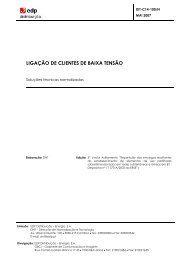notes to the <strong>EDP</strong> consolidated - Energias de Portugal, and company S.A. financial statementsNotes to for the the Consolidated years and ended Company 31 december Financial Statements 2012 and 2011for the years ended 31 December 2012 and 2011The regulatory authority of Brazil, Agência Nacional de Energia Elétrica (ANEEL) issued on 7 February 2012, the Normative Resolution 474, which revised the economicuseful life of assets associated to concessions, and established new annual depreciation rates with retroactive effect from 1 January 2012 onwards. Theimplementation of this change in annual depreciation rates led to an increase in the average usefull life of Bandeirante's and Escelsa's assets from 22 to 24 years and20 to 22 years, respectively.Usefull lives of generation assets - Hydro independent generator in BrazilThe hydro generation assets in Brazil for Independent Generators are amortised during the estimated useful lives, considering the existing facts and circumstances atthe date of preparation of the financial statements which includes, among other issues, <strong>EDP</strong>'s best estimates of the useful lives of such assets, which are consistentwith the useful lives defined by the regulator (ANEEL), the respective contractual residual indemnisation values at the end of each concession period, as well as relatedtechnical and legal opinions. The remaining period of amortisation and the indemnisation values at the end of the concessions, may be influenced by any changes inthe Regulatory Legal Framework in Brazil.Tariff adjustmentsTariff adjustments in Portugal represent the difference between costs and income of the National Electricity and Gas System, estimated at the beginning of each periodfor purposes of calculating the tariff, and the actual costs and income of the System established at the end of each period. The tariff adjustments assets or liabilities arerecovered or returned through electricity tariffs to customers in subsequent periods.Considering the current legislation which establishes an unconditional right of the regulated operators to recover or return the tariff adjustments, the <strong>EDP</strong> Groupbooked in the caption Electricity and Gas sales of the period, the effects of the recognition of the tariff adjustment, against Other debtors / Other Creditors. Under thecurrent legislation, regulated companies can also sell to a third party, in whole or in part, the right to receive the tariff adjustments through the electricity and gastariffs.Tariff deficitIn Portugal, the Decree-Law 237-B/2006, of 19 December 2006, recognised an unconditional right of the operators of the binding sector to recover the tariff deficit of2006 and 2007, regardless of the form of its future payment or in situations of insolvency and cease of operations. The Decree-Law also allows the transfer of the tariffdeficit collection right to a third party. In 2008, the <strong>EDP</strong> Group sold unconditionally the tariff deficit of 2006 and part of deficit of 2007. In 2009, the tariff deficits regarding2008 and the remaining part of 2007 were transferred, as well as the non-regular tariff adjustment regarding the estimated overcost of the special regime productionfor 2009. In September 2011, the <strong>EDP</strong> Group sold unconditional tariff adjustment for the additional cost of cogeneration for the period 2009-2011.In Spain, the Royal Decree Law 6/2009, endorsed on 7 May 2009 establishes, among other matters: (i) the possibility to securitise the Spanish tariff deficit supported bythe electric sector companies using a State guarantee through the tariff deficit amortisation fund; (ii) the calendar for the elimination of the tariff deficit, such that on 1January 2013, access tariffs will be enough to cover regulated activities’ costs, without the creation of an ex-ante tariff deficit and, in order to ease this gradualelimination, the Royal Decree Law also provides for the passage of some costs currently included in the electricity tariff to the Spanish State Budget; (iii) the revocation,as from 1 July 2009, of Royal Decree Law 11/2007, which established the obligation to return the additional revenues obtained from the incorporation of CO2 costs inmarkets prices, and which was to be in force until 2012; (iv) the creation of a social subsidy, which translates to a lower tariff for low income consumers and (v) thecharge to electric companies of the costs with the management and treatment of radioactive waste from nuclear power plants and fuels consumed.The Royal Decree Law 14/2010, endorsed in 2010 addressed the correction of the tariff deficit of the electricity sector. Of this decree, the temporal mismatch of thesettlement of 2010 came to be considered as a revenue deficit of the electricity system and established a set of measures so that the various industry playerscontribute to the reduction, including: the establishment of the generation rates, financing plans of energy efficiency and savings by the generation companies, andvarious regulatory measures that help reduce the additional costs of certain technologies in the special regime.In 2012 was published the Royal Decree Law 1/2012 establishing a moratorium on adding new facilities in the pre-allocation remuneration and the Royal Decree Law13/2012 which provides reductions in the remuneration for the distribution activity and an extraordinary decrease on other regulated activities. Both decrees wereadopted with urgency to reduce the tariff deficit to reach the limit provided for 2012 in the Royal Decree Law 14/2010.<strong>EDP</strong> Group considers, based on the legislation issued, that the requirements for the recognition of tariff deficits as receivables against the income statement areaccomplished.Impairment of long term assets and GoodwillImpairment tests are performed, whenever there is a trigger that the recoverable amount of property, plant, equipment and intangible assets is less than thecorresponding net book value of the assets.On an annual basis the Group reviews the assumptions used to assess the existence of impairment in goodwill resulting from acquisitions of shares in subsidiaries.The assumptions used are sensitive to changes in macroeconomic indicators and business assumptions used by management. The goodwill in associates isreviewed when circumstances indicate the existence of impairment.Considering the uncertainties regarding the recoverable amount of property, plant and equipment, intangible assets and goodwill as they are based on the bestinformation available, changes in the assumptions can result in changes in the determination of the amount of impairment and, consequently, on the Group’s results.Doubtful debtsImpairment losses related to doubtful debts are estimated by <strong>EDP</strong> based on the estimated recoverable amounts, the date of default, debt write offs and other factors.Certain circumstances and facts may change the estimated impairment losses of doubtful debts, namely changes in the economic environment, economic sectortrends, client’s credit risk and increases in the rate of defaults. The evaluation process in determining whether an impairment loss should be recorded in the incomestatement is subject to numerous estimates and judgement. Changes in the estimates and judgement could change the impairment test results which could affect theGroup’s reported results.<strong>EDP</strong> - <strong>Annual</strong> <strong>Report</strong> 2012189
notes to the consolidated <strong>EDP</strong> and - Energias company de Portugal, financial S.A. statementsfor the years ended 31 december 2012 and 2011Notes to the Consolidated and Company Financial Statementsfor the years ended 31 December 2012 and 2011Revenue recognitionElectricity sales revenue is recognised when the monthly electricity invoices are issued, based on actual meter readings or estimated consumption based on thehistorical data of each consumer. Revenue relating to electricity to be invoiced, regarding consumption up to the balance sheet date but not measured, is bookedbased on estimates which take into consideration factors such as consumption in prior periods and analysis relating to the energy balance of the operations.The use of different estimates and assumptions can affect the Group’s revenue and, consequently, its reported results.Income taxesThe Group is subject to income taxes in several jurisdictions. Certain interpretations and estimates are required in determining the global amount of income tax.There are several transactions and calculations for which the ultimate tax determination is uncertain during the ordinary course of business. Different interpretationsand estimates could result in a different level of income taxes, current and deferred, recognised in the year.In Portugal, the Tax Authorities are entitled to review the <strong>EDP</strong>, S.A. and its subsidiaries determination of its annual taxable earnings, for a period of five years for annualperiods starting from 2012, four years for annual periods of 2011 and 2010 and six years for previous annual periods in case of tax losses carried forward. As a result,it is possible that some additional taxes may be assessed, mainly as a result of differences in interpretation of the tax law. However, <strong>EDP</strong> Group and its subsidiariesbelieve that there will be no significant corrections to the income tax booked in the financial statements.Pensions and other employee benefitsDetermining pension and other employee benefits liabilities requires the use of assumptions and estimates, including actuarial projections, estimated rates of returnon investments, discount rates and pension and salary growth and other factors that can impact the cost and liability of the pension, medical plans and other benefits.Changes in the assumptions can materially affect the amounts determined.Provisions for dismantling and decommissioning of power generation unitsThe <strong>EDP</strong> Group considers that there are legal, contractual or constructive obligations to dismantle and decommission of Property, plant and equipment assetsallocated to electricity generation operations. The Group records provisions in accordance with existing obligations to cover the present value of the estimated cost torestore the locations and land where the electricity generations units are located. The calculation of the provisions is based on estimates of the present value of thefuture liabilities.The use of different assumptions in the estimates and judgement from those referred to could lead to different financial results than those considered.Measuremet criteria of the concession financial receivables under IFRIC 12In 2012, was published in Brazil the Provisional Measure 579/12, meanwhile converted into Law 12.783/13, which determines the amount of the indemnizationpayable to the distribution companies regarding the assets not amortised or depreciated at the end of each concession, that should be determined based in themethodology of the new replacement value. This methodology determined an increase in the indemnization amount ( financial asset IFRIC 12 )of Bandeirante andEscelsa, booked, under IFRIC 12 terms, against other operating income. This amount corresponds to the difference between the new replacement value versus thehistorical cost.4. FINANCIAL-RISK MANAGEMENT POLICIESFinancial risk managementThe <strong>EDP</strong> Group’s business is exposed to a variety of financial risks, including the effect of changes in market prices, foreign exchange and interest rates. The Group’sexposure to financial risks arises essentially from its debt portfolio, resulting in interest and exchange rate exposures. The unpredictability of the financial markets isanalysed on an on-going basis in accordance with the Group’s risk management policy. Derivative financial instruments are used to minimise potential adverseeffects, resulting from interest rate and/or foreign exchange rate risks on <strong>EDP</strong> Group's financial performance.The management of financial risks of <strong>EDP</strong>, S.A. and other <strong>EDP</strong> Group entities is undertaken centrally by the Financial Department of <strong>EDP</strong> S.A., in accordance withpolicies approved by the Executive Board of Directors. The Financial Department identifies, evaluates and submits to the Board for approval, hedging mechanismsappropriate to each exposure. The Executive Board of Directors is responsible for the definition of general risk management principles and the establishment ofexposure limits.All transactions undertaken using derivative financial instruments require prior approval by the Executive Board of Directors, which defines the parameters of eachtransaction and approves the formal documents describing their objectives.As for the subsidiaries in Brazil, the Local Risk Management Department is responsible for the management of market risks arising from fluctuation in interest andexchange rates. This management is performed according to the principles/policies set by the <strong>EDP</strong> Group for this geographical area.Exchange-rate risk management<strong>EDP</strong>, S.A. Financial Department is responsible for managing exchange rate risk exposure resulting from foreign currency loans, seeking to mitigate the impact ofexchange rate fluctuations on the financial costs of the <strong>EDP</strong> Group companies and, consequently, on the consolidated results, through exchange rate derivativefinancial instruments and/or other hedging structures.The policy implemented by the <strong>EDP</strong> Group consists of undertaking derivative financial instruments to hedge exchange rate risk with characteristics similar to those ofthe hedged asset or liability. The operations are revalued and monitored throughout their useful lives and, periodically, their effectiveness in controlling and hedgingthe risk that gave rise to them is evaluated.190A World Full Of Energy
- Page 1:
Impresso em papel elaborado com cel
- Page 6 and 7:
: edp :index6 edp6 message to share
- Page 8 and 9:
: edp :EDP - Annual Report 20127
- Page 10 and 11:
Portugalrenewablesgás7,194 Employe
- Page 12 and 13:
: edp :1.1.3. CORPORATEBODIESboard
- Page 14 and 15:
: edp :1.1.5. principles ofsustaina
- Page 16 and 17:
: edp :BRAzILEDP Brasil distinguish
- Page 18 and 19:
: edp :1.3.2. Operating HighlightsU
- Page 20:
: edp :1.3.5. ENVIRONMENT INDICATOR
- Page 24 and 25:
: edp :strategicframeworkxxxxxxxxxx
- Page 26 and 27:
: strategic framework :Reconversion
- Page 28 and 29:
: strategic framework :EVOLUTION OF
- Page 30 and 31:
: strategic framework :million at D
- Page 32 and 33:
: strategic framework :Since 2005,
- Page 34:
: strategic framework :EDP - Annual
- Page 38 and 39:
: a edp :performance38 business40 I
- Page 40 and 41:
: performance :EDP - Annual Report
- Page 42 and 43:
: performance :By the end of the ye
- Page 44 and 45:
: performance :electricity generati
- Page 46 and 47:
: performance :EDP Distribuição h
- Page 48 and 49:
: performance :electricity AND GAS
- Page 50 and 51:
: performance :Despite the increase
- Page 52 and 53:
: performance :electricity supply i
- Page 54 and 55:
: performance :In 2012, EDPR increa
- Page 56 and 57:
: performance :3.1.3. EDP BRAsILEDP
- Page 58 and 59:
: performance :EDP brasilGENERATION
- Page 60 and 61:
: performance :Distribution of comp
- Page 62 and 63:
: performance :testing the adherenc
- Page 64 and 65:
: performance :3.4.1. managementsys
- Page 66 and 67:
: performance :In Brazil, EDP has n
- Page 68 and 69:
: performance :that 117 m 3 of oil
- Page 70 and 71:
: performance :EDP has undertaken t
- Page 72 and 73:
: performance :encourages professio
- Page 74 and 75:
: performance :The set of indicator
- Page 76 and 77:
: performance :Voice of the custome
- Page 78 and 79:
: performance :(ACAPO), are also av
- Page 80 and 81:
: performance :3.7. suppliersThe pe
- Page 82 and 83:
: performance :Transparency; Leader
- Page 84 and 85:
: performance :The following table
- Page 86:
: performance :between the local au
- Page 90 and 91:
: a edp :Corporate governance89 sta
- Page 92 and 93:
: corporate governance :STATEMENT O
- Page 94 and 95:
: corporate governance :STATEMENT O
- Page 96 and 97:
: corporate governance :I. GENERALM
- Page 98 and 99:
: corporate governance :In all othe
- Page 100 and 101:
: corporate governance :II.1.1. Cor
- Page 102 and 103:
: corporate governance :The company
- Page 104 and 105:
: corporate governance :Strategy Co
- Page 106 and 107:
: corporate governance :Companies C
- Page 108 and 109:
: corporate governance :From 22 Feb
- Page 110 and 111:
: corporate governance :The Institu
- Page 112 and 113:
: corporate governance :Careers, Mo
- Page 114 and 115:
: corporate governance :Commercial
- Page 116 and 117:
: corporate governance :Corporate S
- Page 118 and 119:
: corporate governance :new matters
- Page 120 and 121:
: corporate governance :with the Eu
- Page 122 and 123:
: corporate governance :unavailabil
- Page 124 and 125:
: corporate governance :in share ca
- Page 126 and 127:
: corporate governance :II.19. Posi
- Page 128 and 129:
: corporate governance :II.26. Rule
- Page 130 and 131:
: corporate governance :II.28. Posi
- Page 132 and 133:
: corporate governance :Executive B
- Page 134 and 135:
: corporate governance :EDP has no
- Page 136 and 137:
: corporate governance :CHAPTER III
- Page 138 and 139:
: corporate governance :III.3. Hold
- Page 140 and 141: : corporate governance :Share price
- Page 142 and 143: : corporate governance :Capital Mar
- Page 144 and 145: : corporate governance :III.13. Int
- Page 146 and 147: : corporate governance :In 2012, th
- Page 151 and 152: EDP Renováveis opensfirst wind far
- Page 153 and 154: : financial report :5.1. edp group
- Page 155 and 156: : financial report :these impacts,
- Page 157 and 158: : financial report :local currency,
- Page 159 and 160: : financial report :amount of EUR 1
- Page 161 and 162: : financial report :EDP - Energias
- Page 163 and 164: : financial report :EDP - Energias
- Page 165 and 166: : financial report :EDP - Energias
- Page 167 and 168: : financial report :EDP - Energias
- Page 169 and 170: : financial report :EDP - Energias
- Page 171 and 172: 12.pdf 1 02/04/13 14:50notes to the
- Page 173 and 174: notes to the consolidated EDP and -
- Page 175 and 176: notes to the consolidated EDP and -
- Page 177 and 178: notes to the consolidated and compa
- Page 179 and 180: notes to the consolidated EDP and -
- Page 181 and 182: notes to the consolidated EDP and -
- Page 183 and 184: notes to the consolidated EDP and -
- Page 185 and 186: notes to the consolidated EDP and -
- Page 187 and 188: notes to the consolidated EDP and -
- Page 189: notes to the consolidated EDP and -
- Page 193 and 194: notes to the consolidated EDP - and
- Page 195 and 196: notes to the consolidated EDP and -
- Page 197 and 198: notes to the consolidated EDP - and
- Page 199 and 200: notes to the consolidated EDP - and
- Page 201 and 202: notes to the consolidated EDP - and
- Page 203 and 204: notes to the consolidated EDP and -
- Page 205 and 206: notes to the consolidated EDP - and
- Page 207 and 208: notes to the consolidated EDP - and
- Page 209 and 210: notes to the consolidated and compa
- Page 211 and 212: notes to the consolidated EDP - and
- Page 213 and 214: notes to the consolidated EDP - and
- Page 215 and 216: notes to the consolidated EDP - and
- Page 217 and 218: notes to the consolidated EDP - and
- Page 219 and 220: notes to the consolidated EDP and -
- Page 221 and 222: notes to the consolidated EDP and -
- Page 223 and 224: notes to the consolidated EDP - and
- Page 225 and 226: notes to the consolidated EDP - and
- Page 227 and 228: notes to the consolidated EDP - and
- Page 229 and 230: notes to the consolidated EDP - and
- Page 231 and 232: notes to the consolidated EDP and -
- Page 233 and 234: notes to the consolidated EDP - and
- Page 235 and 236: notes to the consolidated EDP and -
- Page 237 and 238: notes to the consolidated EDP - and
- Page 239 and 240: notes to the consolidated EDP - and
- Page 241 and 242:
notes to the consolidated EDP - and
- Page 243 and 244:
notes to the consolidated EDP - and
- Page 245 and 246:
EDP - Energias de Portugal, S.A.Not
- Page 247 and 248:
notes to the consolidated EDP - and
- Page 249 and 250:
notes to the consolidated EDP and -
- Page 251 and 252:
notes to the consolidatedEDPand- En
- Page 253 and 254:
notes to the consolidated EDP - and
- Page 255 and 256:
notes to the consolidated EDP and -
- Page 257 and 258:
notes to the consolidated and compa
- Page 259 and 260:
notes to the consolidated and compa
- Page 261 and 262:
notes to the consolidated and compa
- Page 263 and 264:
notes to the consolidated and compa
- Page 265 and 266:
notes to the consolidated and compa
- Page 269 and 270:
Hydroelectric powerplant of Bempost
- Page 271 and 272:
: annexes :annexesannex Ifinal refe
- Page 273 and 274:
: annexes :by Instituto Superior de
- Page 275 and 276:
: annexes :Chairman of Euronext Lis
- Page 277 and 278:
: annexes :basis. He was designated
- Page 279 and 280:
: annexes :annex IIItransactions pe
- Page 281 and 282:
: annexes :EDP’s material issues
- Page 283 and 284:
: annexes :Simultaneously, the foll
- Page 285 and 286:
: annexes :GRI complianceThis repor
- Page 287 and 288:
: annexes :286A World Full Of Energ
- Page 289 and 290:
: annexes :288A World Full Of Energ
- Page 291 and 292:
: annexes :290A World Full Of Energ
- Page 293 and 294:
: annexes :292A World Full Of Energ
- Page 295 and 296:
: annexes :294A World Full Of Energ
- Page 297 and 298:
: annexes :296A World Full Of Energ
- Page 299 and 300:
: annexes :298A World Full Of Energ
- Page 301 and 302:
: annexes :300A World Full Of Energ
- Page 303 and 304:
: annexes :302A World Full Of Energ
- Page 305 and 306:
: annexes :304A World Full Of Energ
















